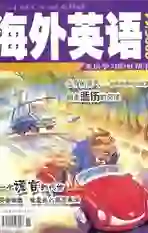流利美语脱口出
2006-11-30范琳琳孙文龙
范琳琳 孙文龙
1. a hangdog look 羞愧的神态;垂头丧气的样子
注解:在中世纪的欧洲,给人类造成死亡或伤害的动物,像人一样,也要受到起诉和审讯。有记载说,1595年在荷兰西部城市Leyden,有个小孩被狗咬伤手指致死,这条狗因此被人们吊死。狗被吊死之事在莎士比亚的剧作中曾提到5次。A hangdog look 一语可能由此而来。现多用来喻指拖着尾巴的丧家之犬。
情景例句:
A: Did you appear in the court?
B: Yeah, he has been punished according to the law.
A: Its good news for all of us.
B: Right. When the criminal appeared in the court with a hangdog look, all the people were standing up excitedly.
A:你去法庭旁听了吗?
B:去了。他被绳之以法了。
A:这可真是个好消息。
B:是呀。当他带着愧疚的神态出现在法庭时,所有在场的人都激动地站了起来。
2. hard cash价高而稳定的货币
注解:此语指notes and coins only(纸币和硬币),一般指可换黄金等价高而稳定的货币,如:In terms of hard cash,weve raised over 200 pounds and in pledge about 8500 pounds.(就现金而言,我们已经筹集了200多英镑,抵押品价值约为8500英镑。)cash down 为动词短语,表示“用现金支付”。
情景例句:
A: I bought a villa with a very beautiful garden.
B: Wow! How comfortable!
A: After we make decorations, welcome to drop in.
B: Thanks. Did you pay it hard cash?
A: Yes.
B: But where the hell did you get the money?
A: Thats a secret.
A:我买了一栋带漂亮花园的别墅。
B:哇,真舒服啊!
A:等装修好之后,欢迎来参观。
B:谢谢。你是用现金买房的吗?
A:是的。
B:你从哪搞来的钱?
A:这是个秘密。
3. hard science硬科学
注解:此语与natural science基本同义,指物理学、化学、生物学、地质学等自然科学。hard scientist则指“自然科学家”。与之相对的是soft science“软科学”,指政治学、经济学、社会学和心理学等人文科学。
情景例句:
A: In my opinion, the development of hard science and soft science is unbalanced at all.
B: Yeah,its true.Most of people just pay attention to the hard science.
A: But the soft science is more important in my eyes. Especially psychology, today, a lot of people live a tense life, feel tired and are easily upset as well.
B: I think we all think we can change everything, desire more than we can obtain.
A:依我看,现在硬科学和软科学的发展一点也不平衡。
B:就是。很多人只关心硬科学。
A:可是在我眼中,软科学更为重要,尤其是心理学。现在人们大多生活在紧张的生活状态中,身体疲惫,内心脆弱。
B:我觉得我们都认为自己可以改变一切,我们的欲望比我们能得到的要多得多。
4. harp on the same string/tune老调重弹
注解:乔叟(1340?~1400)在1033年所写的《特罗勒斯和克丽西德》中用过这条习语,但与现在的形式稍有出入:keeping on one string or harping on the same song。目前的形式是在乔叟之后两个世纪的李利(1554~1606)首先使用的。莎士比亚在《哈姆雷特》等6个剧本中也都用过这条习语。
情景例句:
A: Are you free now?
B: What?
A: Can you lend me some money?
B: Ive already told you that Im broke myself. I wish youd stop harping on the same string.
A: You miser.
A:你现在有空吗?
B:有事吗?
A:能借我点钱吗?
B:我已经告诉过你,我自己也身无分文。你别总是老调重弹。
A:你可真是个吝啬鬼。
5. have up ones sleeve留有一招、锦囊妙计
注解:此语最早形式为have a card/an ace up ones sleeve,表示“玩牌作弊,先把好牌藏起来”,比喻指“留后手”。也可写作keep...up ones sleeve或have...in ones sleeve。
情景例句:
A: He suspects youre having something nasty up your sleeve for him.
B: What a man he thinks that I would be?
A: Dont be so angry. I think maybe someone says something to him behind you.
B: Who does such a senseless thing?
A: Who knows? But you must know there are really such people.
A: 他怀疑你对他藏奸。
B:他把我想成什么人了?
A: 别发火。我想也许有人在你背后对他说了些什么。
B:谁干的这种无聊事?
A: 谁知道?但你必须明白的确有这种人存在。
6. have a bone to pick with对……有意见
注解:出自动物争夺猎物的习性。例如:两只狗为争抢一根骨头而相互撕咬。此语始见16世纪中期,现一般喻指“与某人有争端;对某人不满”。
情景例句:
A:I have a bone to pick with you.
B: Okay. Lets clear the air. What are you getting at?
A: You always have a chip on your shoulder.
B: Im sorry. But I dont mean to get your goat.
A:我对你有点意见。
B:好吧,让我们来消除误会。你指的是什么事呢?
A:你总是容易动怒。
B:我很抱歉,可我并非有意惹你生气。
7. have a field day玩得分外高兴
注解:field day原是军事用语,指“野外演习日”,以后喻指“有重大事或重要活动的日子”“特别愉快的时刻”等。因此have a field day 表示“玩得分外开心”,通常用于口语。
情景例句:
A: I havent seen you for a long time, where have you been?
B: I paid a visit to South Korea.
A: Wonderful! Im sure you have a field day.
B: Yeah, you got it. The scenery was very beautiful.
A: Oh, I think Ill have a travel there when I have such a chance.
A:好长时间没见你,去哪了?
B:我到韩国玩了一圈。
A:真好!我想你肯定玩得十分高兴。
B:就是,你说对了。风景真是漂亮。
A:要是有机会我一定要去转上一圈。
8. have a finger in the pie 参与某事
注解:此处的in the pie 是in making the pie 的省略。pie 是一种西式点心,译作“馅饼”,亦偶见音译作“攀”“排”。此语多用作“多管闲事”或“干涉他人事务”之义。此语亦可作have ones finger in the pie.
情景例句:
A: How much have you yet to do?
B: A lot of things are at hand. Im at my wits end with them.
A: Dont worry. What's the deadline for handing all of them?
B: Next Monday.
A: Well, Ill have a finger in the pie and that will help you out.
A:你还有多少没做?
B:手头的事太多了,我简直都无力招架。
A:别急。什么时候是上交的最后期限?
B:下星期一。
A:我来帮你做点吧。那样你就能早点完成工作了。
9. have a grudge against 对……怀恨在心
注解:此语中的动词have还可由hold ,bear ,harbor ,carry ,nurse 等词代替。与之相应的词组有bear/own sb. a grudge (对某人怀有积怨)。grudge 一词作为动词时,形成词组grudge doing sth,则表示“勉强地,不情愿地做某事”。
情景例句:
A:Some employers seem to have a grudge against women.
B:Where can you see that?
A:They dont want to employ women.
B:But sometimes they are employed, too.
A:Even if they do, they pay them less.
B:Thats unfair.
A:有些雇主似乎对女性有偏见。
B:你哪儿看出来的?
A:他们不愿意雇用女性。
B:但有时她们也被雇用啊。
A:即使如此,工资待遇也相对比较低。
B:那真的不公平。
